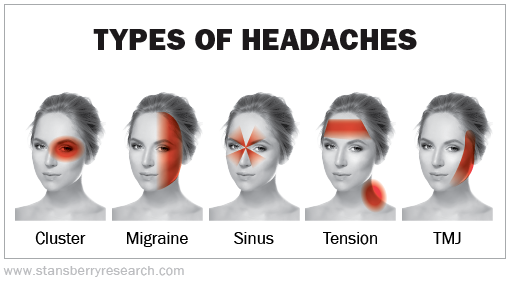About 1 in 6 Americans have chronic (or recurring) headaches.
The pain ranges from a minor annoyance to a debilitating condition. Headaches can make you lose focus, make you feel nauseated, blur your vision, or send you searching for a dark, quiet room.
The most severe form of headaches (migraines) cost the U.S. $20 billion every year in medical expenses and missed days of work.
Here are our fixes for getting rid of the five most common types of headaches...
Cluster Headaches
Cluster headaches usually affect one area just above or behind the eye on one side of the head. These headaches get their name for their frequency. You'll get clustered bouts of pain for a period of about two weeks to three months (with up to several waves of pain every day). You can then go through periods with no pain at all.
Fix: Stick to your sleep schedule. Very little is known about what triggers cluster headaches, but they involve a part of the brain called the hypothalamus. This is the area responsible for your circadian rhythm and your hormones – particularly your sleep hormones. As such, sticking to a regular routine with enough good-quality sleep can help prevent cluster headaches.
Some researchers suggest that sleep issues like insomnia or sleep apnea can trigger these headaches. If you suspect you have a sleep disorder, find a sleep center near you where you can get tested. The Sleep Education Center has a sleep-facility-location service right here.
Migraines
Migraines are the most severe headaches. They often involve throbbing pain on one side of the head. Things like light or movement can make them worse, and many migraine sufferers experience nausea as well. Migraines can spring up from a number of causes including certain foods, exercise, stress, or hormones. They generally last from four hours to three days.
Fix: Keep track of headache-causing foods and drinks. Several foods and beverages may trigger headaches, particularly migraines. These include red wine, artificial sweeteners, coffee, and food with nitrates (like hot dogs). However, each person's trigger is different. Keeping a journal to track your meals and your headaches will help you figure out which foods to avoid.
[optin_form id="286"]
Sinus Headaches
Sinus headaches happen when your sinus cavity is inflamed. The inflammation causes dull or throbbing pain in your face around your eyes and across your forehead. One way to recognize a sinus headache is if you bend down and the pain gets worse because of the pressure on the sinuses. You might also get symptoms of a sinus infection like a fever, excessive mucus, or congestion.
Fix: Clean out your nose. I've written before about using a Neti pot to clear out my sinuses during allergy season. It helps to alleviate the pressure and clear out any irritants. Likewise, keeping an air purifier in your bedroom will help clear out any pollen or other allergens.
Tension Headaches
Tension headaches are the most common type of headache. There are many different causes, including everything from stress, to dehydration, to simply sleeping on your neck muscles wrong. Because of the many different triggers, these headaches can last anywhere from a half hour to a week.
Fix: Hydrate. Dehydration causes many of the headaches we get. Our brains are about 75% water, so when we start to lose that water, our brains actually shrink. That change triggers pain, which is our body's way of telling us to drink more.
I usually only get headaches after I work out and don't hydrate or stretch enough. So whenever you feel a headache starting, go for the water right away.
And remember, drinks with caffeine and alcohol do the opposite – they'll make you more dehydrated. That's why I recommend a glass of water after every glass of wine.
Fix: Massage. Massage is one of the best headache relievers. Because so many tension headaches result from sore neck muscles, a good massage can help alleviate the pain. Plus, stress-busting techniques like listening to music and meditating can also help with tension headaches.
TMJ Headaches
TMJ stands for "temporomandibular joint," or the joint where your lower jaw hinges into your skull. Sometimes this joint wears out over time or suffers damage from a blow to the face. But many cases of TMJ result from stress. When you feel stress, you may clench your jaw or grind your teeth in your sleep, putting strain and pressure on your joint.
Fix: Avoid overworking your jaw. Stop chewing gum or other extremely chewy foods. If you grind your teeth, try using a plastic night guard to protect your teeth as you sleep. And as with tension headaches, gently massaging the jaw muscles can also relax your TMJ.
Fortunately, most headaches become less frequent as we age.
Two important things to remember:
1) If you're on certain medications, headaches could be a side effect. Make sure to check the drug label and speak your doctor.
2) If you experience more headaches as you age, it could be a sign of cardiovascular problems or small strokes. A good rule of thumb is that if you experience new types or more frequent headaches, check it out with your doctor.
What We're Reading...
- When it's not just a headache – Cleveland Clinic answers when you should seek medical help for a headache.
- Yoga Journal reviews the best poses to alleviate tension headaches.
- Something different: Do you live in one of the chattiest states in the U.S.?
Here's to our health, wealth, and a great retirement,
Dr. David Eifrig and the Retirement Millionaire Daily Research Team
April 18, 2016

